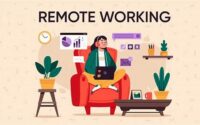Freelancers Launch Agencies For Higher Income
- Synergy and Success: The Agency Advantage
- Why More Freelancers are Taking the Agency Route
- Understanding the Shift
- The Motivations Behind the Move
- Summary of “Freelancers Launch Agencies for Higher Income”
- Perspectives on the Transition
- Maximizing Efficiency and Profits
- Insightful Points on Agency Formation by Freelancers
In the bustling gig economy, more freelancers are finding their stride. But what if tapping into the entrepreneurial spirit could lead them to a more rewarding path? This is where the trend of freelancers launching agencies for higher income comes into play. By pooling resources, skills, and networks, freelancers are crafting scalable solutions that provide not only higher revenue but also enhanced professional credibility.
Read More : Tools That Help You Handle Freelance Invoicing Automatically
Imagine a world where freelancers no longer work in isolation. Instead, they join forces, creating an agglomerate of talents that can tackle larger projects that offer more significant compensation. This synergy allows them to diversify their services, attract bigger clients, and cover a broader market spectrum. It’s not just about higher income; it’s about evolving traditional freelancing into an innovative business model that empowers multiple professionals.
Synergy and Success: The Agency Advantage
The trend of freelancers transitioning into agency owners is not just a fleeting fad. It’s backed by a need for stability in an otherwise volatile work environment. As freelancers band together, they reduce the risks associated with inconsistent workflows and client churns. It’s like turning a solo act into the main event; the benefits of collaboration lead to efficiency and stronger client relationships.
In a world where permanence is rare, agencies bring a semblance of stability. They support not just the freelancers-turned-entrepreneurs, but also the clients, who enjoy the security of a more structured entity. Whether it’s in graphic design, content writing, or marketing, freelancers launching agencies for higher income is reshaping the freelancing landscape with a modern twist that’s both sustainable and profitable.
Why More Freelancers are Taking the Agency Route
Freelancers have always been at the frontier of innovation and change. It’s only natural for them to seek growth opportunities beyond the confines of individual capabilities. Launching an agency offers a platform for personal growth while enhancing one’s professional network. Plus, let’s face it: being your own boss with a team sounds much cooler than flying solo, balancing deadlines, and a volatile client list.
—
The gig economy has been at the heart of modern employment, with freelancers across the globe embracing its flexibility and diversity. However, there’s a noticeable shift as these entrepreneurial spirits seek more robust and resilient paths to financial success. As freelancers launch agencies for higher income, they’re redefining what success looks like in the freelance world.
Understanding the Shift
At the core of every gig worker lies an inherent desire for growth—professionally, financially, and personally. The increasing trend of freelancers launching agencies is fueled not only by the desire for higher income but also by the need to navigate the challenges posed by the gig economy. There’s an elegance in collaboration that single-handed freelancing often lacks.
The Backbone of the Agency Model
Agencies provide a structured framework that translates into tangible success. Freelancers, by forming agencies, are no longer constrained by limitations of time, expertise, or resources. Instead, they capitalize on collective expertise, allowing them to bid for larger projects with confidence and deliver impressive results.
The agency framework offers several advantages, such as risk diversification and the freedom to explore larger creative concepts. As teams grow, skill sets diversify, leading to an enhanced ability to deliver value to clients. In simple terms, freelancers launching agencies for higher income is a strategic, progressive, and empowering movement.
The Motivations Behind the Move
Freelancers are driven by factors beyond just financial gains. The promise of stability through collaboration allows them to focus on core competencies while delegating other tasks within the agency. This delegation of tasks often leads to improved client satisfaction and better quality of work, crucial for long-term financial success.
The agency route allows freelancers to explore uncharted territories, innovate, and carve out niches in saturated markets. As freelancers pool their resources—some having expertise in management, others in creative execution—there’s a synergy that larger clients find appealing. The result? A win-win situation where freelancers and clients both thrive.
Despite the complexities involved in forming an agency, the potential advantages often outweigh the initial hurdles. Among these are increased networking opportunities, ongoing support, and a shared vision—all crucial components for scaling and sustaining a successful business in today’s competitive landscape.
In essence, freelancers launching agencies for higher income is not just a trend but a dynamic evolution for those willing to blend creativity with strategic action, setting new benchmarks for success.
—
Summary of “Freelancers Launch Agencies for Higher Income”
When considering the decision to launch an agency, freelancers primarily look at the financial benefits. It’s more than just about income; it’s about multiplying opportunities for both monetary and professional growth. Teaming up allows freelancers to negotiate better deals and optimize task distribution, ultimately leading to higher productivity and increased earnings.
For freelancers, launching agencies is an opportunity to enjoy more than just a paycheck. True, the agency brings in bigger clients with higher budgets, but it also allows for constant learning and development, raising one’s market value. Individual freelancers often find this journey both financially and creatively rewarding. Indeed, launching an agency opens doors to creative fulfillment and financial security, allowing freelancers to dream bigger and achieve more together than they ever could alone.
—
Transitioning from a lone wolf freelancer to an agency can be daunting. However, the synergy created by freelancers launching agencies for higher income often leads to discovering untapped potential and new market opportunities. Beyond financial gains, agencies present unparalleled chances for professional development and experimentation with cutting-edge projects.
Perspectives on the Transition
The move from freelancing to managing an agency is akin to stepping onto a bigger stage. It’s about finding the right partners who share a vision and complementing individual strengths. As agencies grow, so does the opportunity to push creative boundaries and initiate groundbreaking projects that freelancers can only dream of handling alone. Collaboration at this scale not only boosts income but enriches the work experiences of all involved.
Navigating the Challenges
While the transition brings its share of challenges, including management complexities and the need for effective communication, those embarking on this journey often find it rewarding. Alliances between freelancers pave the way for powerful consortiums, enabling them to better adapt to market changes and foster innovation. With shared responsibilities, freelancers can focus more on creativity, ensuring that their services stand out in a highly competitive marketplace.
Maximizing Efficiency and Profits
From streamlining operations to spreading overhead costs, agencies allow freelancers to maximize both efficiency and profitability. The ability to delegate, specialize, and improve workflows results in top-quality outputs without burnout—a win-win for both freelancers and clients. Moreover, the stability offered by the agency model inspires confidence and encourages long-term client relationships.
Ultimately, the shift from freelancer to agency owner marks a transformative journey full of potential, as individuals grow together, pooling their talents to reach higher pitches of success.
—
Insightful Points on Agency Formation by Freelancers
The journey doesn’t stop at forming agencies. With constant innovations and emerging trends, the freelancing landscape is forever shifting, making adaptability crucial for sustainability. By observing market movements and client needs closely, freelancers launching agencies for higher income are uniquely positioned to lead and excel.
As the line between traditional employment and freelancing continues to blur, the role of agencies becomes pivotal. Agencies serve as a vital bridge between the creative spontaneity of freelancing and the structured reliability of corporate life. With this dynamic blend, freelancers can expect a future dotted with challenges but rich in opportunities for growth, success, and fulfillment.


